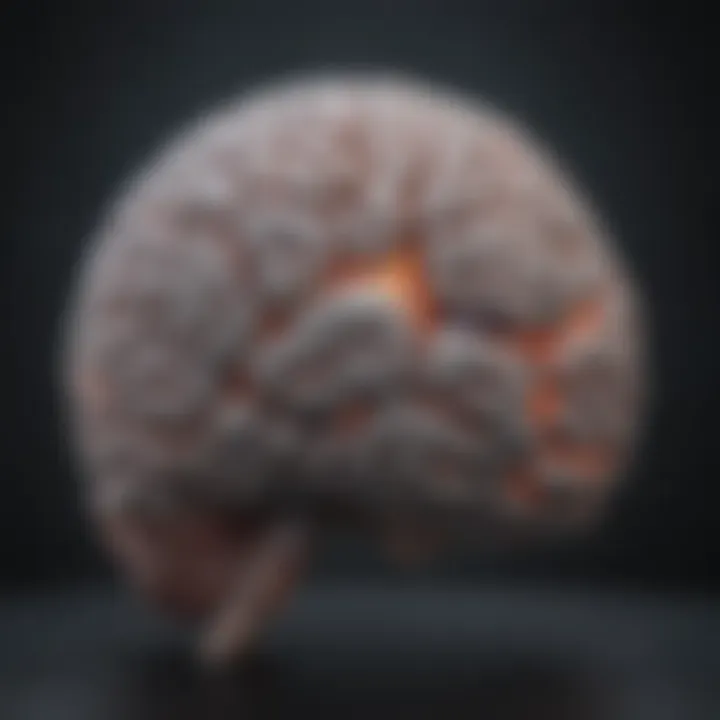Risks of Alcohol Use After Traumatic Brain Injury


Summary of Objectives
This article investigates the nuances of alcohol consumption following a traumatic brain injury (TBI). It aims to shed light on the associated risks and the potential impact on recovery. Additionally, it discusses how alcohol affects the neurological aspects of the brain and offers guidelines for individuals with a history of TBI. By delving into existing studies and expert viewpoints, this article seeks to provide well-rounded and evidence-based conclusions.
Importance of the Research
Understanding the safety of alcohol consumption post-TBI is vital for anyone affected by such injuries. With an increasing number of individuals sustaining TBIs, the interactions between alcohol and recovery are crucial. This research could help inform best practices and guidelines, contributing positively to public health.
Results and Discussion
Presentation of Findings
Research indicates that alcohol can have detrimental effects on the brain, particularly after a TBI. Studies highlight several key points:
- Alcohol can lead to increased inflammation in the brain, which may complicate recovery.
- Individuals with TBIs may already be dealing with cognitive impairments. The addition of alcohol can worsen these issues.
- Alcohol might interfere with medications prescribed for TBI recovery, reducing their efficacy.
"The consumption of alcohol post-TBI could become an obstacle to return to baseline functioning; thus, caution is advised."
Implications of Results
The implications of consuming alcohol after a TBI are far-reaching. They underscore the necessity for careful consideration before indulging in alcoholic beverages.
- Recovery Time: Consuming alcohol can lead to prolonged recovery periods. This can be especially problematic for individuals needing to rehabilitate cognitive and physical functions.
- Mental Health: There is a correlation between alcohol use and increased anxiety or depression in those recovering from TBIs.
- Guidelines Suggested: Experts recommend individuals refrain from alcohol for at least six months post-injury. Regular check-ins with healthcare providers are essential for monitoring progress.
Cognitive functions, already compromised by injury, may decline further with alcohol intake. It is essential for individuals and caregivers to educate themselves on these risks. Consulting with healthcare providers before making decisions on alcohol consumption is advisable.
Understanding Traumatic Brain Injury
Understanding traumatic brain injury (TBI) is crucial for evaluating the overall safety of alcohol consumption post-injury. TBIs can have profound and lasting effects on an individual’s health, cognitive function, and emotional well-being. Grasping the nature of TBIs helps in recognizing the nuances that accompany recovery, especially when complicating factors such as alcohol consumption enter the picture. This section will discuss the definition and types of TBI, the symptoms that manifest, and provide an overview of TBI statistics.
Definition and Types of TBI
Traumatic brain injury refers to damage to the brain caused by an external force, often resulting from accidents, falls, or blows to the head. TBIs can be classified into two main categories: closed injuries and open injuries. Closed injuries occur when the skull is not broken, while open injuries involve a breach in the skull. Understanding these classifications is essential, as they can lead to different recovery trajectories and complications.
Other types include concussions, which are considered mild TBIs, and more severe forms like contusions or penetrative injuries. Recognizing these distinctions forms the foundation for developing appropriate guidelines for alcohol consumption after experiencing a TBI.
Symptoms of TBI
Symptoms following a traumatic brain injury can vary significantly from person to person. They may include:
- Headaches
- Confusion or disorientation
- Memory problems
- Balance and coordination issues
- Mood swings and behavioral changes
Many symptoms can be subtle, leading to misdiagnosis or underreporting. It is vital for individuals or their caregivers to monitor for these signs closely as they may influence decisions regarding post-injury lifestyle choices, including the consumption of alcohol.
Statistical Overview of TBIs


Statistics around traumatic brain injuries present a sobering picture. According to the Centers for Disease Control and Prevention (CDC), approximately 2.5 million TBIs occur annually in the United States. A significant portion of these results in hospitalization or the need for extended care.
Moreover, data show that young adults and seniors are most affected, with the leading causes being falls and motor vehicle accidents. In light of these figures, the need to understand the implications of lifestyle choices, including alcohol consumption, after a TBI becomes evident. It is also noteworthy how demographic factors could influence recovery outcomes, making it all the more critical to consider the role of alcohol during this recovery phase.
"Understanding TBI is not just about immediate damage; it's about anticipating long-term effects on life quality and decision-making strategies, including alcohol usage."
In summary, a thorough understanding of traumatic brain injury sets the stage for deeper discussions about alcohol consumption. Identifying the types, symptoms, and statistics associated with TBIs underscored the importance of seeking informed guidance when considering post-injury lifestyle adjustments.
The Impact of Alcohol on Brain Health
The relationship between alcohol consumption and brain health has significant implications, especially for individuals recovering from traumatic brain injury (TBI). Understanding how alcohol affects the brain is crucial for patients, caregivers, and healthcare professionals. This part of the article discusses how alcohol alters neural function, its long-term impact on brain health, and its specific effects during the recovery phase after a TBI.
Neuroscience of Alcohol Consumption
Alcohol acts as a central nervous system depressant. It influences neurotransmitter systems, primarily by enhancing the effects of gamma-aminobutyric acid (GABA), an inhibitory neurotransmitter. This can lead to a temporary state of relaxation and euphoria. However, chronic alcohol use can disrupt the balance of neurotransmitters, causing alterations in mood, perception, and cognition.
Neuroscience research highlights that alcohol consumption can lead to neurotoxicity. It might cause neuronal death, especially in regions such as the prefrontal cortex and hippocampus. These areas are essential for decision-making, impulse control, and memory formation. Given that TBI also disrupts such functions, the combination of TBI and alcohol can exacerbate cognitive deficits.
Long-term Effects of Alcohol on the Brain
Long-term alcohol consumption can lead to several adverse outcomes for brain health. Chronic use is associated with brain shrinkage, specifically in the cortex and cerebellum. This shrinkage can lead to difficulties in coordination, motor skills, and cognitive function.
In addition to structural changes, alcohol can also lead to cognitive decline. Research indicates that individuals with a history of alcohol abuse may experience markedly reduced memory and executive functioning capabilities. Furthermore, withdrawal symptoms can occur with cessation, which complicates recovery processes, particularly for those recovering from TBI.
Studies indicate that the cognitive impairments associated with alcohol dependency are similar to those seen in TBI patients, highlighting the risks of combining the two.
Alcohol and Brain Recovery Post-TBI
Recovery from a TBI is a complex process that involves physical, emotional, and cognitive rehabilitation. Alcohol consumption during this period poses significant risks. It can hinder neuroplasticity, the brain's ability to reorganize itself by forming new neural connections. This is critical for recovery, as patients need their brains to adapt post-injury.
Alcohol can also exacerbate symptoms such as fatigue, dizziness, and mood swings, leading to decreased motivation for rehabilitation activities. Patients may find it harder to engage in therapy if they are consuming alcohol. Moreover, alcohol may interfere with medications prescribed for pain management or mood stabilization, further complicating the recovery process.
In summary, the implications of alcohol consumption on brain health cannot be overlooked, particularly in the context of recovering from TBI. Both its immediate effects on neurotransmitters and its long-term consequences on brain structure and function illustrate the potential dangers. Understanding these risks is essential for informed decision-making regarding alcohol use after experiencing a TBI.
Risks of Alcohol Consumption After TBI
Understanding the risks associated with alcohol consumption following a traumatic brain injury (TBI) is crucial. Alcohol can adversely affect recovery, influence cognitive function, and heighten health concerns. The interaction between a brain injury and the effects of alcohol is complex and multifaceted. Assessing these risks allows medical professionals and patients to make informed decisions regarding alcohol consumption post-injury.
Cognitive Impairment Risks
Cognitive impairments are common after TBI. Alcohol may exacerbate these issues. Research indicates that alcohol can affect memory, attention, and problem-solving abilities. The brain is still healing from the injury, and introducing alcohol can slow down cognitive recovery.
Studies have shown that individuals with a history of TBI who consume alcohol may experience more severe cognitive deficits than those who abstain. Regular alcohol use can lead to worsening symptoms, making it more challenging to manage day-to-day tasks. Cognitive impairments may manifest as:
- Difficulty concentrating
- Memory loss
- Impaired judgment and decision-making


Understanding these risks is essential for patients as they navigate recovery. It is imperative for individuals recovering from TBI to weigh their desire for alcohol against potential cognitive consequences.
Physical Health Concerns
Physical health is another significant area where alcohol consumption after TBI poses risks. Alcohol can disrupt healing processes, affect coordination, and heighten the risk of subsequent injuries. Injuries to the brain can lead to balance issues, and alcohol can further impair this. This can result in falls or accidents, which could be detrimental to someone recovering from a TBI.
Additionally, alcohol is known to impact different body systems. Chronic consumption may lead to:
- Liver disease
- Cardiovascular complications
- Weakened immune response
These health concerns are vital, particularly in the context of recovery. The body is already under stress due to the injury, and adding alcohol can jeopardize physical health and overall recovery rates.
Mental Health Considerations
Mental health is a pivotal aspect of recovery after a TBI. Individuals may experience challenges such as depressed mood, anxiety, or post-traumatic stress disorder (PTSD). Alcohol, as a depressant, can worsen these conditions. It can create a cycle where individuals drink to cope with their feelings but end up feeling worse as a result.
Research suggests that individuals with TBI have an increased risk of developing substance use disorders. Alcohol often becomes a means of escaping painful emotions or experiences associated with the injury. This can lead to:
- Increased feelings of isolation
- Heightened anxiety and stress levels
- Deterioration of social relationships
The implications for mental health are significant. Alcohol consumption can obscure the path to recovery and renovation of mental well-being, making it essential for patients to pursue healthy coping strategies instead.
Ultimately, the decision to consume alcohol after a TBI should be approached with careful consideration of the cognitive, physical, and mental health risks involved.
Guidelines for Alcohol Consumption After TBI
Understanding the appropriate guidelines for alcohol consumption after sustaining a traumatic brain injury (TBI) is crucial for both recovery and long-term health. This section will delve into the comprehensive recommendations that individuals should consider when pondering the implications of alcohol post-TBI. The interplay between alcohol and brain health remains a significant topic of discussion, thereby necessitating well-informed choices. The following subsections explore essential medical recommendations, personal considerations, and the importance of consultations with healthcare providers.
Medical Recommendations
Medical professionals generally advise caution regarding alcohol consumption following a TBI. Recovery can be complex and varies widely among individuals. Key recommendations include:
- Abstinence Initially: It is often recommended that patients abstain from alcohol for several months post-injury. This period allows for an initial phase of healing, reducing the risk of complications.
- Gradual Reintroduction: If the decision to drink is made after the recovery phase, it should be approached cautiously. Starting with small amounts can help monitor impacts on cognition and physical health.
- Understanding Individual Responses: Each person’s reaction to alcohol post-TBI may differ due to factors such as age, severity of injury, and pre-existing conditions. Medical advice can provide personalized insights to navigate these nuances.
"The recovery journey post-TBI is unique to every individual. Observing one's limits and adjusting consumption accordingly is essential for maintaining brain health."
Personal Considerations
When contemplating alcohol consumption after TBI, personal circumstances must also be taken into account. Important aspects to consider include:
- Mental Health Status: Individuals with a history of mental health issues may be more vulnerable to the detrimental effects of alcohol. Hence, they should evaluate the potential risks carefully.
- Social Circumstances: Engaging in social activities where alcohol is present can lead to peer pressure. Assessing personal comfort with these situations is critical.
- Support Networks: Having a supportive environment for recovery can influence decision-making about alcohol. Informed discussions with family or friends can provide clarity and support.
Consultation with Healthcare Providers
Engaging with healthcare professionals is vital before making any decisions regarding alcohol consumption after TBI. The following steps can facilitate informed discussions:


- Schedule Regular Check-Ups: Regular appointments with a neurologist or rehabilitation specialist can ensure continual assessment of recovery and cognitive health.
- Ask About Risks: Inquire about the specific risks associated with alcohol in relation to individual health profiles. This includes understanding complications that might arise from alcohol consumption post-TBI.
- Follow-Up on Recommendations: Keeping track of how alcohol consumption affects recovery is important. This feedback loop can guide future decisions regarding drinking.
By understanding these guidelines, individuals can make better-informed choices that reflect their unique circumstances. Balancing personal desires with medical advice lays the groundwork for safer alcohol consumption after experiencing a traumatic brain injury.
Case Studies and Expert Opinions
Understanding the safety of alcohol consumption after a traumatic brain injury (TBI) requires a blend of empirical evidence and personal experiences. This section delves into case studies of survivors, expert opinions from neurologists, and insights from rehabilitation specialists. Each provides a unique perspective, contributing to a comprehensive understanding of how alcohol can affect those recovering from TBI.
Case Studies of Survivors
Case studies serve as illustrative accounts of individuals who have navigated life post-TBI, particularly regarding alcohol consumption. These narratives highlight the varied outcomes that can arise from alcohol use, underscoring the individualized nature of recovery. For instance, one survivor might report using alcohol to cope with emotional distress, leading to increased cognitive difficulties and a setback in recovery, while another may find moderate consumption manageable without apparent consequences.
The specific details of these case studies can be enlightening. They often depict how factors such as the severity of the TBI, pre-existing health conditions, and support systems influence the impact of alcohol. It is vital to approach these anecdotes with caution but appreciate that they can reveal the complexities of recovery.
Expert Opinions from Neurologists
Expert insights from neurologists provide a scientific framework to evaluate the consequences of alcohol consumption after TBI. Neurologists emphasize that alcohol can hinder brain healing, particularly in the first few months post-injury when the brain undergoes significant changes. They warn that even low to moderate levels of alcohol can impair cognitive functioning, which is already compromised due to to the injury.
Experts often refer to studies indicating correlation between alcohol consumption and adverse outcomes like increased risk of subsequent injuries or complications. They recommend a preventive approach, advising abstinence or at least significant moderation during recovery. Additionally, neurologists stress the necessity of personalized assessments, as individual responses to alcohol can vary widely.
Insights from Rehabilitation Specialists
Rehabilitation specialists focus on the importance of holistic recovery. They provide valuable insights relevant to alcohol consumption. These professionals consider the psychological elements of TBI recovery, noting that alcohol can serve as a shortcut to temporary relief for some individuals yet may lead to long-term challenges, including dependence or worsened mental health symptoms.
They often advocate establishing coping strategies that do not include substance use. Rehabilitation programs may incorporate education about the risks of alcohol and develop alternative approaches to manage stress and emotional challenges. The insights from these specialists can help patients and families navigate decisions regarding alcohol, emphasizing a comprehensive approach to rehabilitation.
Important Insight
"The relationship between alcohol and recovery varies uniquely from person to person, making informed choices crucial."
Together, these perspectives reveal the multifaceted dynamics of alcohol consumption post-TBI, emphasizing that safety and recovery are influenced by a variety of factors. They remind clinicians, patients, and caregivers of the need for continuous dialogue regarding alcohol's role in post-injury life.
Epilogue and Future Directions
The examination of alcohol consumption after traumatic brain injury (TBI) yields important conclusions relevant to both recovery and ongoing research. Understanding the effects of alcohol on the brain, particularly after injury, is crucial in guiding patients, healthcare providers, and caregivers. The synthesis of findings presents a clearer picture of the nuances related to alcohol and TBI, revealing both risks and considerations.
Summary of Findings
The article underscores significant points regarding the interplay of alcohol and brain health post-TBI. Evidence suggests that alcohol exacerbates cognitive impairments and may hinder recovery. Additional insights show a correlation between alcohol consumption and negative mental and physical health outcomes. Statistically, the risks increase, particularly concerning the individual’s recovery journey. These findings advocate for a cautious approach to alcohol post-TBI, emphasizing the need for deeper understanding and tailored guidelines.
Implications for Research
Future research is essential. There remains a gap in comprehensive studies focusing on the long-term effects of alcohol post-TBI. Further exploration can unravel specific mechanisms through which alcohol interacts with the injured brain. Additionally, understanding the psychological dimensions—such as the reasons behind alcohol use in this population—could lead to better intervention strategies. Ultimately, enhancing awareness and research can aid in developing more robust guidelines for at-risk individuals, contributing to safer recovery practices.
Final Recommendations for Patients
For those that suffered a TBI, it is recommended to prioritize brain health over alcohol consumption. Here are key points to consider:
- Consult with healthcare providers regularly about your recovery milestones.
- Assess mental health periodically, as changes in mood or cognition might indicate problems linked with alcohol use.
- Engage in healthy lifestyle choices, including balanced nutrition and regular exercise, that support brain recovery.
- Limit or abstain from alcohol, especially in the early stages of recovery. Decisions regarding alcohol must be taken with caution.
The decision to consume alcohol after a TBI should not be taken lightly. Consultation with medical professionals can provide tailored advice based on individual recovery paths.
In sum, while alcohol consumption may seem benign to some, its implications for those recovering from TBI warrant serious consideration. A cautious approach, coupled with ongoing research, will pave the way for informed decisions and improvements in recovery outcomes.















